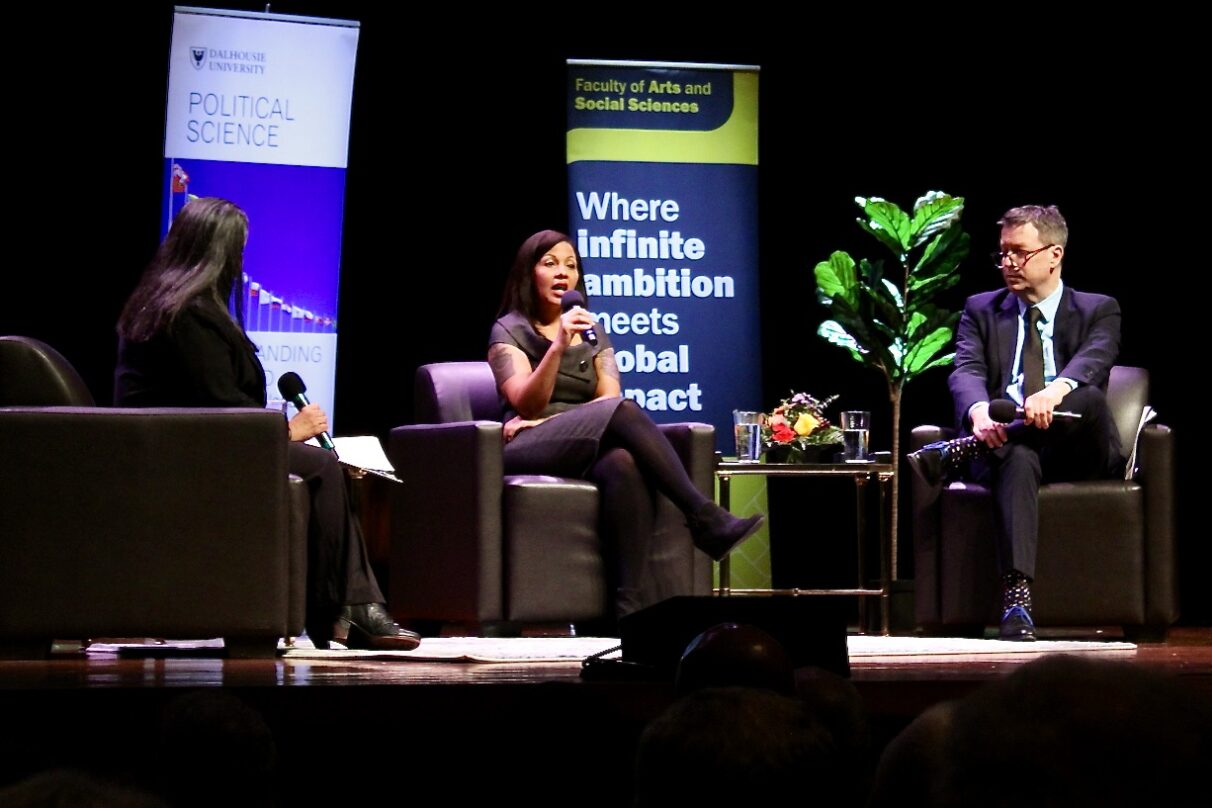Trump presidency will be ‘politics without guarantees’, Dal conference hears
Panellists discuss the U.S. election and the fate of global democracy

caption
Featured left to right: Debra Thompson, Joe Clark and Doug Sanders at the 2024 Stanfield Conversation.In an evening of political anxiety and “bad news,” speakers at a panel discussion Wednesday evening remained optimistic for a world during and after the second Trump presidency in the United States.
“I’m concerned that now divisions are rising again. Instead of seeing our whole, we are seeing our ambition,” said former prime minister Joe Clark, who concluded the 2024 Stanfield Conversation at the Rebecca Cohn Auditorium with his fears and hopes for the future.

caption
Joe Clark: “If there is one thing that is clear, it is that these kinds of serious conversations are going to be more important to our future than they might have been when the idea was conceived.”The 2024 Stanfield Conversation featured panellists Doug Saunders, a reporter for the Globe and Mail, and Debra Thompson, Canada research chair at McGill University. They talked about the recent U.S. election and the fate of democracy worldwide.
The Stanfield Conversations are hosted by Dalhousie University to honour the legacy of former Nova Scotia premier and federal Conservative leader Robert L. Stanfield. The annual lecture series is designed to address the challenges to democracy nationally and around the world.
While there have been an unprecedented number of elections around the world this year, said Saunders, “that quickly brings us to the bad news, which is that 2024 has also been this century’s worst year for democracy.”
Saunders, who was named journalist of the year at this year’s National Newspaper Awards, said he’s concerned about free press, the rule of law and respect for opposition, which he sees disintegrating in countries around the world today.
“We’re in a period of flux, incoherence, transition. It’s what cultural theorists call the politics without guarantees,” said Thompson. “We might not like what emerges on the other side.”
Disillusionment was a key topic for both panellists. While many Trump supporters believe in his views on immigration and abortion, Thompson said, some don’t but instead “feel hampered by political correctness, they feel hamstrung by DEI (diversity, equity and inclusion), they feel like generally that the left has gone too far.”

caption
‘Democratic guardrails at this point in time have either disintegrated, have been co-opted, or are in grave danger,’ said Debra Thompson.They agreed that 20th-century political language can’t define what’s happening today.
“They don’t have an ideology,” said Saunders. “It’s not like communism vs. capitalism in the old Cold War.”
Instead, he said, leaders like Trump use fear to attract voters, fear of an imaginary leftist agenda, fear of invasion, and fear of “populations within who are unknown.”
“It’s useful for historians to point out that the rhetoric that Donald Trump uses is fascist rhetoric,” said Saunders.
The Stanfield Conversations have been held every year since 2021. Robert L. Stanfield is remembered provincially for modernizing the delivery of health care and education to Nova Scotians.
The first Stanfield Conversation was Democracy on Edge, and since then has covered topics such as Technology, Media Fragmentation, and the Crisis of Democracy in 2022 and Can Democracies Meet the Challenge of Climate Change? in 2023.
Jamal Raaki, an urban development and political science student at Dalhousie University, said the talk left him optimistic for the future.
“Sometimes I feel like with social media it’s easy to get lost in the feelings that one stance is super right and one might not be, and I think this provided a lot of nuance.”
With countless unknowns still in the air as the evening came to a close, Thompson left the audience with an image of hope:
“We take care of each other. We can. Those moments of kindness that have sustained us through hundreds of years of terrible things, we can find that again. We can do that for each other, and so I am not hopeless.”
About the author

Eamon Irving
Eamon Irving will graduate this spring with a Bachelor of Journalism (Honours) degree from the University of King’s College.
